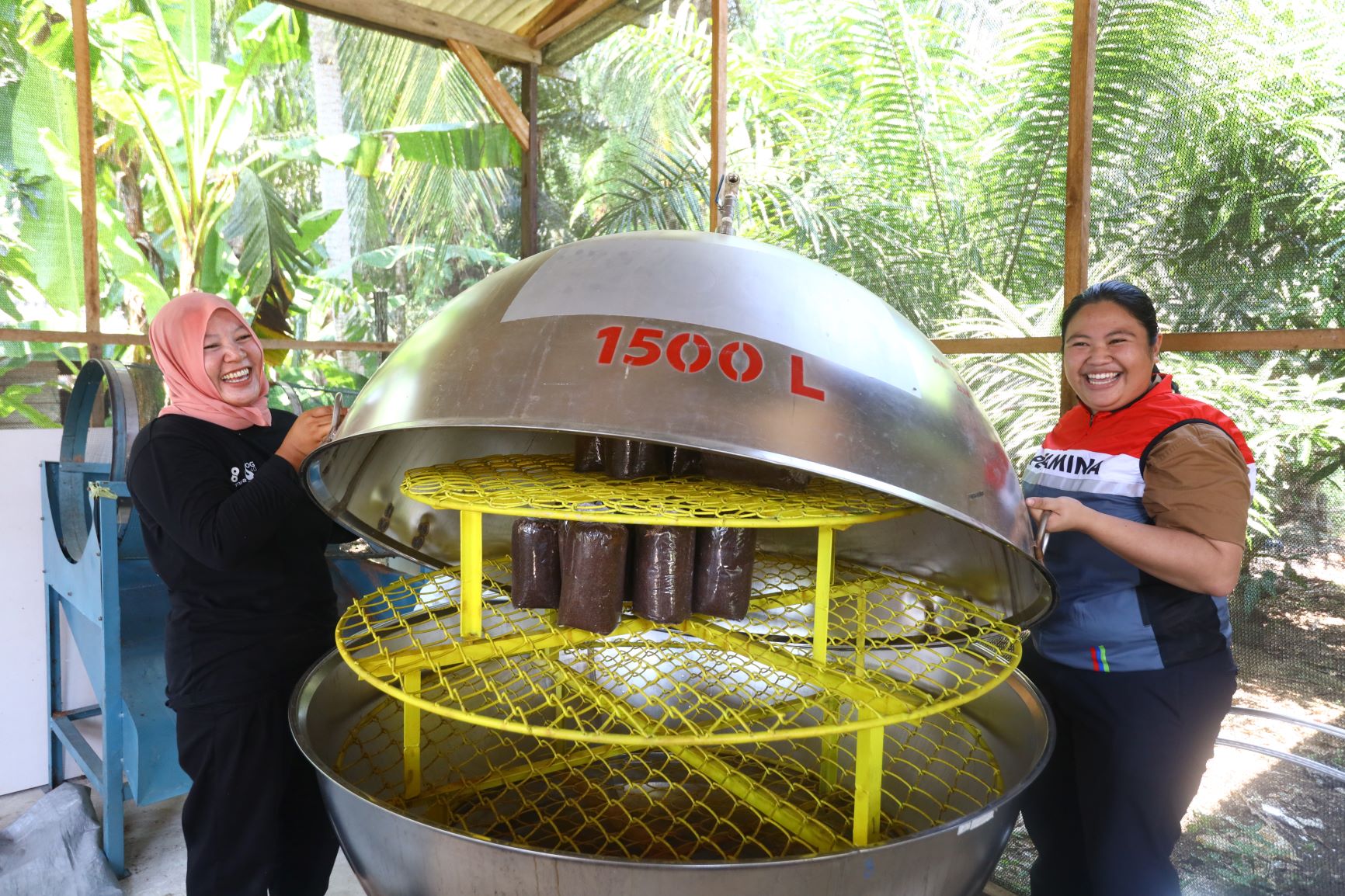04
Dec

Penajam Paser Utara– PT Pertamina Hulu Kalimantan Timur (PHKT) has implemented several innovations to promote the success of the mushroom cultivation program in Penajam Paser Utara Regency (PPU). The mushroom cultivation program is one of PHKT's flagship CSR initiatives titled 'Semur Cendawan Program' (Semai Jamur dengan Cerdas dan Berwawasan Pangan) in Waru Village, which commenced in early 2022.
Several innovations utilized in this program include the implementation of Social Innovation through the Core Business Model Plusma and the utilization of non-B3 waste material from the company, namely the Sterilisasi Media Jamur dalam Bejana (SEMENJANA).
"The Plasma Core Business Model is a partnership business model accompanied by guidance and development by core business players, demonstrating the principles of mutual need, mutual reinforcement, and mutual benefit," said Suwantono Widji, Kalimantan Field Manager, on Wednesday (November 15).
Additionally, Suwantono mentioned that in response to the considerable market demand, the supported group participates in collective mushroom cultivation by maximizing agricultural land through intensified mushroom and horticulture cultivation. Additionally, this endeavor functions as a shared and all-encompassing learning hub. "The utilization of the Plasma Core Business Model in this mushroom cultivation program is exceptional within the Penajam Paser Utara region," he emphasized.
Wahab, the Chair of the Mushroom Star Group under PHKT, described the situation before PHKT introduced the Semur Cendawan program, highlighting that mushroom cultivation was limited to a small scale and the effective use of sawdust waste was not optimized. This limitation arose from the traditional production methods, leading to elevated production expenses, further exacerbated by a need for more expertise in generating independent seeds.
"PHKT has transformed the conventional mushroom cultivation system into high-yield mushroom cultivation through the use of simple appropriate technology that is easy to apply and follow," Wahab explained.
Additionally, according to Wahab, PHKT played a role in reactivating the Kelompok Wanita Tani (KWT), which previously had limited access to agricultural activities. However, now KWT members have a source of income for their families through mushroom cultivation, which also resolves the issue of intensifying backyard land to become productive.
The success of mushroom cultivation depends highly on the growth of mushroom mycelium spores, which is significantly influenced by the planting medium or Baglog's conditions. The Baglog sterilization process determines the success of mushroom mycelium growth.
Previously, continued Suwantono, the Semur Cendawan Program used conventional sterilization methods involving used drums, taking approximately 9-12 hours or the equivalent of 1 unit of 3 kg LPG to sterilize 120 Baglogs. This process could have been more efficient in using LPG energy. To address this issue, PHKT's DOBS successfully developed a simple technology, namely the SEMENJANA (Mushroom Media Sterilization in a Vessel) device created using non-B3 waste material from PHKT, such as iron plates and maximum insulation usage, capable of saving energy by up to 50%.
"With the capacity of the SEMENJANA device for 240 Baglogs and a sterilization process taking only about 4-5 hours, the energy savings from a 3 kg LPG gas reach 50%. This device has also registered for a simple patent under Intellectual Property Rights (IPR)," Suwantono clarified.
Since the inception of the Semur Cendawan program, according to Suwantono, the community's mindset regarding land use change can be altered through activities that intensify the use of remaining land.
"This mushroom cultivation is also able to address the issue of sawdust waste in Waru Village, making mushroom cultivation a solution to several problems simultaneously and becoming a driver of farmer prosperity through additional income sources from mushroom cultivation," he concluded.
Meanwhile, Dony Indrawan, the Manager of Communication Relations and CID at PHI, emphasized the commitment of PHI and its subsidiaries, including PHKT, to persist in developing innovative and sustainable CSR programs.
"In line with PT Pertamina (Persero) policy, we persist in advocating for environmentally conscious operations and business practices. Our company supports every innovation that can save and preserve the environment as climate change mitigation and adaptation, including in the company's CSR program,"
According to Dony, during the Semur Cendawan Program implementation, the program not only generated economic value but also contributed to the utilization of 240 tons/year of sawdust waste, a reduction of 40.77 tons of CO2 emissions/year, and efficiency in the sterilization process with the SEMENJANA device, capable of reducing heat loss by 0.37 GJ/year.
PT Pertamina Hulu East Kalimantan (PHKT) is a subsidiary of PHI that manages upstream oil and gas operations and business by ESG (Environment, Social, Governance) principles in the East Kalimantan & Attaka Working Area in East Kalimantan. PHKT, with other PHI subsidiaries and affiliates, continues to carry out various innovations and technological applications in producing safe, efficient, reliable, compliant, and environmentally friendly energy to realize #EnergiKalimantanUntukIndonesia. More information about PHI is available at https://phi.pertamina.com.